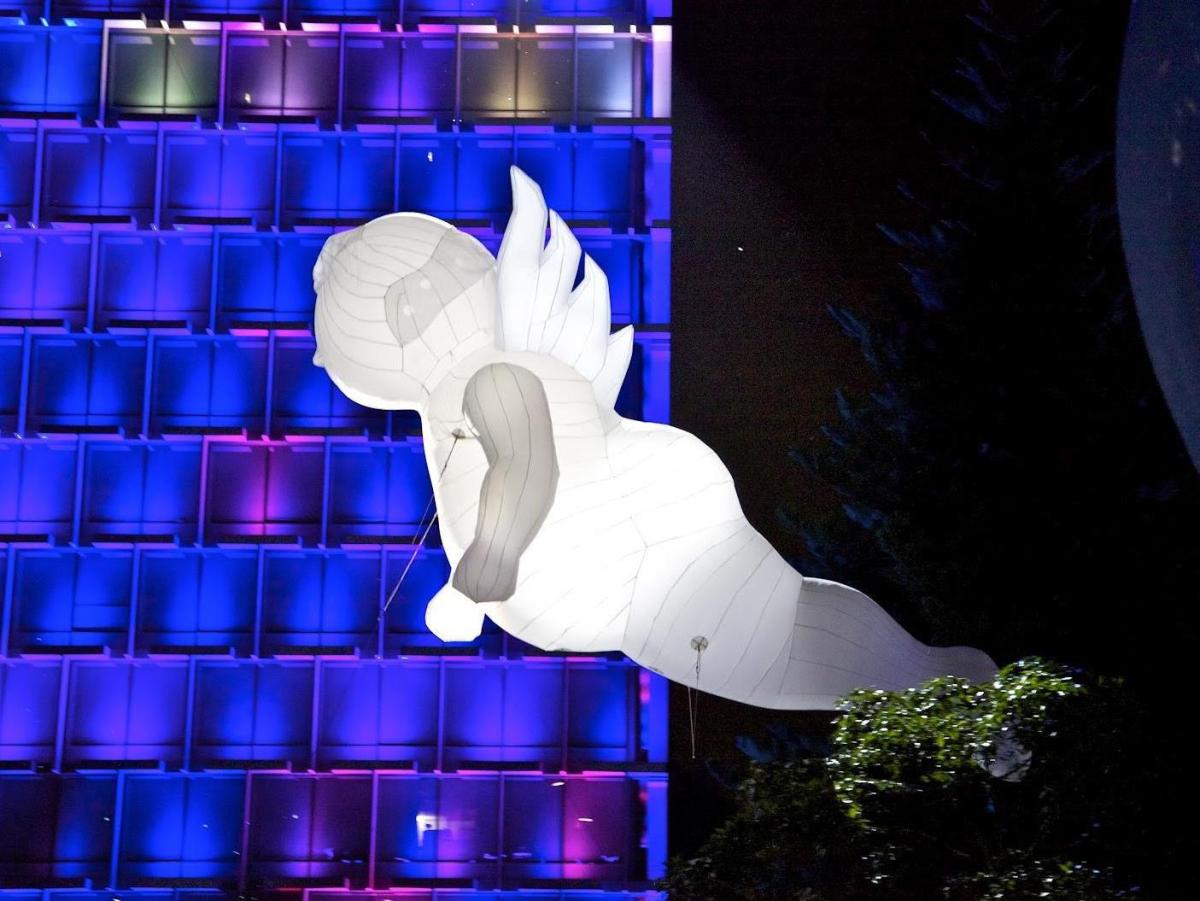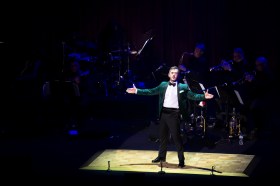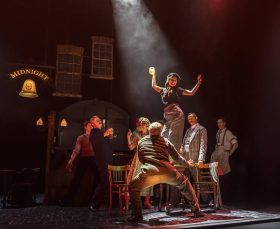Les Studios de Cirque’s Place des Anges opened the 2012 Perth Festival in spectacular fashion. Image via perthandotherplaces.blogspot.com.au
Unlike performing arts venues, which exist 365 days of the year, arts festivals are relatively ephemeral and are consequently significantly harder to justify to both the general public and to governments, said Holloway, who has been Artistic Director of the Perth International Arts Festival since 2012 and was formerly Artistic Director of the Norfolk & Norwich Festival in the UK.
Speaking to delegates at last week’s Australian Performing Arts Centres Association (APACA) conference in Hobart, Holloway challenged the audience by comparing the value of the festivals with the value delivered by performing arts centres.
‘Venues work year round, so you have a physical location, and so everyone in your community knows that’s what that building is for; everyone in your city or town knows that that is the focus for the arts … Festivals don’t have any physical structure, and so for [most] of the year all we have is ideas and words.’ Consequently, Holloway said, the story for festivals ‘has to be exquisite’.
‘The other issue that festivals face is that festivals are fundamentally unjustifiable, really. When you look at a team of people working year round for between 10 and 23 days of output, how do you justify festivals?’ he asked, before quickly answering his own provocation with an illustration of all that festivals could achieve.
‘If you put aside the fact that festivals, because of their resources, because of their positioning and because of the licence they have, are often the first people to bring to any new country the first artists, they are often the people to break new ground; and festivals have the ability to bring in an economic impact against the spend during those 23 days which is one of the greatest economic impacts in the arts.
‘If you put aside the fact that festivals can define cities like Edinburgh and Avignon and Perth and Sydney, and can help people recognise the value of that place and so can allow companies to appoint new staff and attract people and to seem like they are real big players in the world; if you put aside the fact of what they can do for place-shaping and politics; and if you put aside the fact that they have the ability and resources to commission a huge amount of work which then ripples through the economy and gives artists new opportunities – if you put all of that aside, festivals are pretty much unjustifiable.’
The real challenge for festivals – and for performing arts centres – was to find the best stories to tell and the best way to communicate the value of those stories to both the general public and key stakeholders in all levels of government, Holloway said.
In Hobart, he used the metaphor of the bumblebee to help explain the value and impact of a major arts festival such as PIAF.
‘Festivals are like bumblebees. They’re the bumblebees of the arts, because there’s no way a festival, or a bumblebee, can get off the ground. It’s not aerodynamically, scientifically, physically possible for either a festival to work or for a bumblebee to fly … but yet, bumblebees and festivals do get off the ground. And they give a similar effect to the world – they go out and they flourish and they bring pollen from one place to another, from community to community, picking up ideas, picking up artworks, picking up moments and artists and they carry them from place to place and by doing that germination happens. That’s what they bring.’
When festivals were done right, ‘and festivals aren’t always done right … then there is a kind of magic that can be created,’ he continued.
‘One of the things I love about magic, if magic is an art form, is … that no-one watching that complex trick can imagine that that much work has gone into preparing for that moment of the reveal … You have that moment where the reveal happens and you say “This is our festival for this year,” and people somehow forget that 25 people have worked insanely hard the [rest] of the year to make that happen.’
Holloway concluded his address by offering a frank insight into the programming aspect of a Festival Director’s role, and of the role the media played in promoting a festival’s program.
‘Every venue, ever programmer in the world will tell you they’ve never booked a show because the image was beautiful and would fill that perfect page they’ve got left in your program. Every programmer will say that’s never happened. So let’s assume that’s true,’ he said, to appreciative laughter.
‘And then you get to the media. Particularly about festivals, okay, this is the formula. Everyone says, why do Australian festivals ask for exclusivity on international work when my festival is four and a half thousand kilometres from the next festival, so why would we want exclusivity? And the answer is: there are only four major outlets for writing in Australia, so if an event goes to Sydney Festival and then Perth Festival we won’t get any coverage.’
Without such coverage, a festival’s ability to influence place-making and politics, and to encourage artistic cross-fertilisation, was significantly impeded, Holloway continued.
‘So some of why you want exclusivity is to own that space and to be part of a big critical discourse and not be a covers version of a festival. And also part of it is about being distinctive.
‘The media we have has increased over the last few years, from a book value of everything written and broadcast about the festival … it’s gone from $5 million value to $15 million value, and that’s because we’ve fed the beast; we’ve given journalists Martin Amis. Now if you ask Martin Amis to speak you’re going to give him good coverage; if you ask Margaret Atwood to speak, she’s going to get extraordinary coverage,’ he said.
‘They’re also great artists. I would never do anything cynically, and I don’t do anything for just one of those reasons; one of them is in the driving seat but usually there’s two or three. And the best gigs: the audience will love them, the stakeholders will love them, the media will love them, and everyone will go “wow he got dot dot dot – isn’t he amazing?” It’s an ego thing as well, honestly,’ Holloway said, before adding with a laugh: ‘No! It’s all about the art!’
Harvest: Fresh ideas for Performing Arts: the 28th APACA Conference was held in Hobart over 1-4 July, 2014





